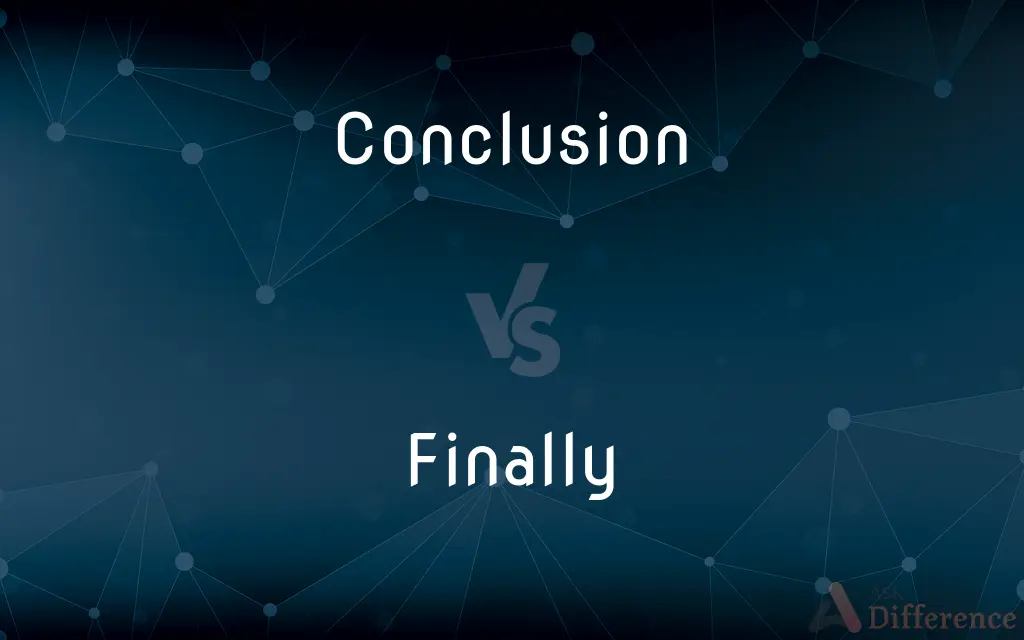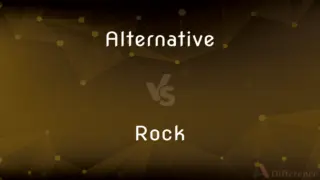Conclusion vs. Finally — What's the Difference?
By Tayyaba Rehman — Updated on November 6, 2023
"Conclusion" refers to the end or final part of something, often summarizing or encapsulating the main points, while "Finally" denotes the last in a series or the end of a long wait.

Difference Between Conclusion and Finally
Table of Contents
ADVERTISEMENT
Key Differences
In writing and speech, "Conclusion" serves as the segment where arguments or premises are drawn together to form a final statement, providing closure to the discourse. "Finally" is used to indicate the last point in a list or the end of a progression, often bringing a sense of relief or culmination.
The term "Conclusion" is formal and is commonly used in academic or professional contexts to signify the analytical ending of a piece of work. It is where the outcomes of discussion or research are summarized. "Finally," however, is used to indicate the end of a sequence or to introduce the last argument or point in a discussion, carrying a sequential connotation rather than an analytical one.
"Conclusion" implies a sense of completion and is often preceded by in-depth analysis or exposition. It is the part where everything comes together, leaving the reader or listener with a final thought or summation. In contrast, "Finally" is more about timing and sequence. It is not necessarily analytical but indicates that after several points, steps, or a period, the end has been reached.
In essence, "Conclusion" is the thoughtfully derived end-point of an argument or narrative, providing a summary or a final inference. "Finally" marks the end of a list, sequence, or wait, and is more about the order of things rather than the synthesis of ideas.
Comparison Chart
Usage in Text
Signifies the end of an argument or text
Indicates the last point or end of a sequence
ADVERTISEMENT
Function
To summarize or provide finality
To denote the end of a process or wait
Formality
More formal, used in academic conclusions
Less formal, used in general lists or sequences
Position in Text
Typically found at the end of essays or reports
Can be used throughout the text as needed
Relation to Content
Summarizes or encapsulates content
Marks a transition or an end
Compare with Definitions
Conclusion
The final part of something.
The conclusion of the book left readers in awe.
Finally
Used to introduce the last point or idea.
Finally, I would like to thank everyone for their participation.
Conclusion
A judgment or decision reached by reasoning.
His conclusion was based on careful analysis of the data.
Finally
At the end of a series of events or steps.
She cleaned the entire house and finally sat down to rest.
Conclusion
A summary of the main points of an argument or theory.
In her conclusion, she recapped the key points of her presentation.
Finally
Indicating a conclusion after consideration of all relevant matters.
He finally chose the college he would attend.
Conclusion
The close or last part; the end or finish
The conclusion of the festivities.
Finally
Used to emphasize the end of a sequence of events.
And finally, the moment we have all been waiting for!
Conclusion
The result or outcome of an act or process
What was the conclusion of all these efforts?.
Finally
After a long time, typically involving difficulty or delay.
Finally, after hours of discussion, they made a decision.
Conclusion
A judgment or decision reached after deliberation.
Finally
Forming or occurring at the end; last
The final scene of a film.
Conclusion
A final arrangement or settlement, as of a treaty.
Finally
Of or constituting the end result of a succession or process; ultimate
An act with both an immediate and a final purpose.
Conclusion
(Law) The formal closing of a legal complaint or pleading.
Finally
At the end or conclusion; ultimately.
The contest was long, but the Romans finally conquered.
Conclusion
A proposition that follows from the premises of a formal proof, for instance from the major and minor premises of a syllogism.
Finally
(sequence) To finish (with); lastly (in the present).
Finally, I washed my dog.
Conclusion
The proposition concluded from one or more premises; a deduction.
Finally
(manner) Definitively, comprehensively.
The question of his long-term success has now been finally settled.
Conclusion
The end, finish, close or last part of something.
Finally
At the end or conclusion; ultimately; lastly; as, the contest was long, but the Romans finally conquered.
Whom patience finally must crown.
Conclusion
The outcome or result of a process or act.
Finally
Completely; beyond recovery.
Not any house of noble English in Ireland was utterly destroyed or finally rooted out.
Conclusion
A decision reached after careful thought.
The board has come to the conclusion that the proposed takeover would not be in the interest of our shareholders.
Finally
After a long period of time or an especially long delay;
At length they arrived
Conclusion
(logic) In an argument or syllogism, the proposition that follows as a necessary consequence of the premises.
Finally
The item at the end;
Last, I'll discuss family values
Conclusion
(obsolete) An experiment, or something from which a conclusion may be drawn.
Finally
As the end result of a succession or process;
Ultimately he had to give in
At long last the winter was over
Conclusion
(law) The end or close of a pleading, for example, the formal ending of an indictment, "against the peace", etc.
Conclusion
(law) An estoppel or bar by which a person is held to a particular position.
Conclusion
The last part of anything; close; termination; end.
A fluorish of trumpets announced the conclusion of the contest.
Conclusion
Final decision; determination; result.
And the conclusion is, she shall be thine.
Conclusion
Any inference or result of reasoning.
Conclusion
The inferred proposition of a syllogism; the necessary consequence of the conditions asserted in two related propositions called premises. See Syllogism.
He granted him both the major and minor, but denied him the conclusion.
Conclusion
Drawing of inferences.
Your wife Octavia, with her modest eyesAnd still conclusion.
Conclusion
An experiment, or something from which a conclusion may be drawn.
We practice likewise all conclusions of grafting and inoculating.
Conclusion
The end or close of a pleading, e.g., the formal ending of an indictment, "against the peace," etc.
Like the famous ape,To try conclusions, in the basket creep.
Conclusion
A position or opinion or judgment reached after consideration;
A decision unfavorable to the opposition
His conclusion took the evidence into account
Satisfied with the panel's determination
Conclusion
An intuitive assumption;
Jump to a conclusion
Conclusion
The temporal end; the concluding time;
The stopping point of each round was signaled by a bell
The market was up at the finish
They were playing better at the close of the season
Conclusion
Event whose occurrence ends something;
His death marked the ending of an era
When these final episodes are broadcast it will be the finish of the show
Conclusion
The proposition arrived at by logical reasoning (such as the proposition that must follow from the major and minor premises of a syllogism)
Conclusion
The act of ending something;
The termination of the agreement
Conclusion
A final settlement;
The conclusion of a business deal
The conclusion of the peace treaty
Conclusion
The last section of a communication;
In conclusion I want to say...
Conclusion
The act of making up your mind about something;
The burden of decision was his
He drew his conclusions quickly
Conclusion
The end or finish of an event or process.
The project came to its conclusion ahead of schedule.
Conclusion
Final arrangements or agreements.
They finally reached a conclusion in the negotiations.
Common Curiosities
How is "finally" used differently from "conclusion"?
"Finally" is used to indicate the last point or end of a sequence, not necessarily offering a summary.
Can "finally" be used at the beginning of a sentence?
Yes, "finally" can start a sentence to introduce the last point or idea.
Does "finally" imply a long wait or difficulty?
Yes, "finally" often conveys the end of a long process or wait.
Is "conclusion" only used in writing?
No, "conclusion" can be used in both writing and speech.
Can "finally" be used in formal writing?
While less formal than "conclusion," "finally" can be used in formal writing to indicate sequence.
What does "conclusion" mean?
"Conclusion" refers to the final part of something, summarizing the content or providing a decision.
Is "conclusion" used for summarizing?
Yes, a "conclusion" often summarizes or encapsulates the main points of a discourse.
Are "conclusions" only found at the end of texts?
Typically, yes, "conclusions" are at the end, summarizing the preceding content.
Can "finally" be used to indicate relief?
Yes, "finally" can express relief that something has ended.
Does a "conclusion" always follow an argument?
Often, a "conclusion" will follow and summarize an argument, but it can also be the end of a narrative.
Can "finally" be replaced with "at last"?
Yes, "finally" and "at last" can often be used interchangeably to indicate the end of a wait or sequence.
Is "conclusion" a formal closure?
"Conclusion" is a formal term that provides closure to a discussion or text.
Is "finally" used in arguments?
"Finally" can be used to introduce the last point in an argument.
Can "conclusion" refer to an agreement?
Yes, "conclusion" can also mean a final agreement or arrangement.
Does "finally" suggest an order of points?
Yes, "finally" indicates the last point in a list or sequence.
Share Your Discovery

Previous Comparison
Alternative vs. Rock
Next Comparison
Assyrian vs. BabylonianAuthor Spotlight
Written by
Tayyaba RehmanTayyaba Rehman is a distinguished writer, currently serving as a primary contributor to askdifference.com. As a researcher in semantics and etymology, Tayyaba's passion for the complexity of languages and their distinctions has found a perfect home on the platform. Tayyaba delves into the intricacies of language, distinguishing between commonly confused words and phrases, thereby providing clarity for readers worldwide.
















































